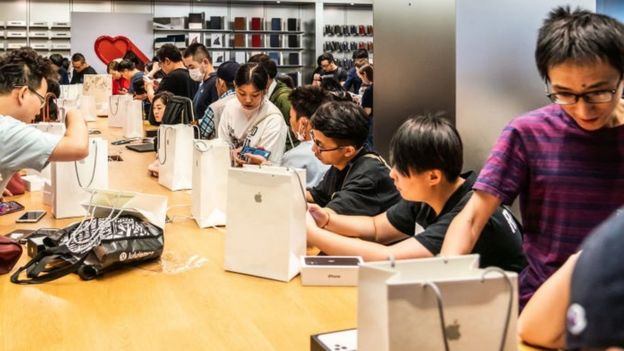HOW CHINA -US CONTENTION IS PARTITIONING THE WEB
When Hyunjin Website design enhancement visited Beijing in July a year ago, she looked through Google News on her cell phone and found a few reports about an assault on the city's US government office.
A partner educator at the College of Kansas' reporting office, she circumvent China's exacting computerized media controls on account of the meandering arrangement of her US telephone firm. This enabled her to get to sites, for example, those from Google not accessible in China.
"I was educating my Chinese companions regarding the bomb exploding outside the [US] consulate and they didn't have the foggiest idea what I was discussing, on the grounds that this news wasn't showing up in their hunt channels," reviews Prof Website design enhancement, who shows seminars on computerized media.
Her experience is normal for any westerner visiting China.
The web on the planet's most crowded nation is intensely confined and blue-penciled, driving specialists to hypothesize that later on there could be two unmistakable online worlds - one drove by China and one by the US.
The fact of the matter was made a year ago by previous Google CEO Eric Schmidt.
At a private occasion, when a business analyst asked Mr Schmidt (presently a board individual from Google parent organization Letter set) about the capability of the web dividing into various sub-virtual worlds with various guidelines, he answered, "I think the in all probability situation currently isn't a chipping, but instead a bifurcation into a Chinese-drove web and a non-Chinese web drove by America.
Such a partition is as of now set up, because of the Incomparable Firewall of China, an administration supported program that controls content inside its advanced fringes. Chinese clients can't get to Facebook, Twitter, Dropbox or Pinterest, among other well known locales.
They likewise can't peruse online data on the Tiananmen Square slaughter or analysis went for President Xi Jinping. Indeed, even online pictures of Winnie the Pooh have been restricted in China after dissidents contrasted President Xi's face with the great Disney character.
"In probably the greatest market on the planet, tech organizations are leaving since they can't completely work how they need to, by openly sharing data on the web," notes Ms Website design enhancement.
Such restriction implies abroad organizations are hampered on the off chance that they need to venture into China - one of the most alluring markets on the planet.
Regardless of the size of the organization, to work in China abroad firms need to pay some dues that can mess them up.
While Apple administrations and items are accessible in China, the California-based tech monster has started discussion over its exercises in the Chinese market. In 2017, China requested that Apple expel the New York Times and Skype application from its Application Store. Apple agreed.
Google has additionally swam into Chinese waters, just to be met with exceptional analysis. Most quite, Google covertly took a shot at a variant of its internet searcher to go facing Chinese-conceived Baidu.
The Chinese-just Google would edit a few outcomes identifying with human rights infringement and questionable laws. "Undertaking Dragonfly" was revealed in a 2018 article by The Capture, and Google inevitably rejected the venture.
"At the point when you enter search terms in China on their internet searcher, you get an alternate outcome from what you find in the West," says Sarah Cook, senior China explore investigator at Opportunity House, a US free guard dog concentrating on human rights. "The red lines of what is being controlled are always moving."
2019 imprints the fourth year straight that Opportunity House has positioned China at the base for Web opportunity in its yearly report "Opportunity on the Net
A business hoping to enter China needs to either play by the principles or leave. For instance, LinkedIn doesn't enable Chinese clients to get to politically touchy profiles or posts from individuals outside the nation.
Why such confinements on an apparatus explicitly intended to open up computerized domains of data, media and discussion?
"That restriction identifies with the authenticity of the Chinese Socialist Gathering and advancing an official story about the country state," says Renren Yang, an associate educator of present day Chinese mainstream society at the College of English Columbia.
While Chinese web clients can't utilize Google and WhatsApp, they have Chinese reciprocals, Baidu and WeChat.
In the interim, Amazon shut down its online store in China prior this year despite poor deals attempting to go up against Alibaba.
Isn't China previously making its very own parallel web?
"A detached Chinese web is cut off from the remainder of the world," says Ms Cook. "What's more, is stressing that different nations are replicating what China is doing by blocking access to specific locales or hindering net help during fights or rallies."
Prof Yang says it would just profit China to introduce increasingly Western organizations looking to carry its administrations to the nation. "For instance, rivalry with Chinese nearby telecom organizations will bring forth the innovation of new advances and new administrations that individuals can manage the cost of and use. Rivalry delivers advancement."
Prof Web optimization isn't idealistic China will change its online tune at any point in the near future. "Since China has supplanted Western media with their very own applications and destinations, they don't generally require western tech organizations."
Different specialists are cheerful that a fragmenting of the Web won't be lasting.
Prof Yang says: "At some point, I'd prefer to see the Incomparable Firewall descend, much the same as the Berlin Divider did."
Subscribe Us
Mainmean.blogspot.com
Popular Posts
Blog Archive
Search This Blog
Breaking News
Contact Info
Contact List
Skype:Blow Fbl
Behance.net/username
WhatsApp: +233242630315
Recent Blog Posts
About Me
Contact Form
Hello I Am Qudas Cherubino
Translate
Live chat
POPULAR POSTS

Footer Menu Widget
Designed with by Way2Themes | Distributed by Blogger







0 Comments